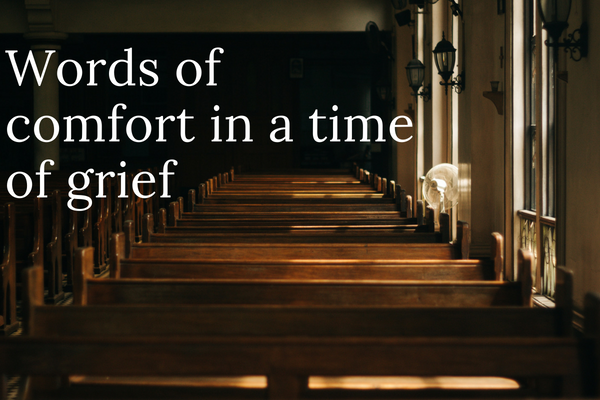We have all heard that saying “If you don’t have anything nice to say, then don’t say anything at all” or my preferred version courtesy of one Ms. Clairee Belcher “If you don’t have anything nice to say, come sit by me” from the very southern, very Louisiana, Steel Magnolias.
But what happens when you think you ARE saying something nice, but it turns out to be irritating at best, or hurtful at worst?
It is so hard to watch a loved one suffer. It feels awkward and uncomfortable. We want to help; we want to make it stop. But guess what. Suffering is a part of life. Always has been. Always will be. So the sooner we can be comfortable supporting and loving one another through it, the better off we will be.
My family has seen more than its fair share of funerals. Funerals for old people, funerals for young people, funerals following a long illness, and funerals following a sudden death. Death can be ugly and scary and painful. But it can also be beautiful and peaceful and quiet.
In attending funerals, and being part of the crew who are comforted, PEOPLE SAY SOME STUFF Y’ALL!! And while I know it can be well-intentioned, I’mma let you in on a little secret … usually they are not saying these things to comfort those left behind. They are saying these things because they are trying to make an awful situation feel less awkward for themselves. They want to help their friend who is suffering, but don’t know how.
Let me help you out.
10 Things Not to Say to a Grieving Loved One & 10 Things to Say Instead
God must have needed him more than you.
 Not to get too heavy into theology, but God is the Almighty Creator who created us out of love. He doesn’t “need” anyone/anything. “I’m praying for you” is much more well-received. “I pray that God sends the peace of the Holy Spirit upon you.” “I am praying you feel God’s love and comfort during your time of grief.”
Not to get too heavy into theology, but God is the Almighty Creator who created us out of love. He doesn’t “need” anyone/anything. “I’m praying for you” is much more well-received. “I pray that God sends the peace of the Holy Spirit upon you.” “I am praying you feel God’s love and comfort during your time of grief.”
You look so good!
Why is this even something that needs to be brought up? And I cannot tell you how many times I heard that. You know what’s better? “I’m praying for you.” “I am so sorry for your pain.” “I am so sorry for your loss.”
You have an angel in heaven now.
Again, not to get into theology, but we don’t turn into angels after we die. We are higher up on the chain-of-holiness than the angels. They have a SAINT in heaven, not an angel. Also, probably not super helpful to someone who wants their loved one here on earth. Again “I’m praying for you” and “I’m so sorry for your loss” are great go-tos.
At least you still have your other child/sibling/parent.
But I want this one. One is not a substitute for the other. “I am so sorry for your family’s loss” and “I am praying for you” are both much more sensitive.
You’re still young! You can have more children.
#theybrave see above.
You have to be strong for [other family members].
Gee, thanks for the added pressure. A grieving person needs to be able to not be strong. Let’s give them a strength break for a hot minute. Instead, maybe acknowledge their strength in standing in front of the casket of someone they loved more than you did, and yet they are comforting you: “Your strength during this time is remarkable.”
God doesn’t give you more than you can handle.
This isn’t even scripturally sound. God isn’t doling out suffering in heaven. Again, theologizing a bit here, but suffering is a result of the human condition, not the will of God. And if you’ve ever read Job, people get A LOT more than they can handle. More on why that is a beautiful thing that connects humans in a later post. If you feel like your friend can handle their grief, that is your subconscious telling you that they are stronger than they feel. Acknowledge that. “I admire your strength / faith / fortitude in the face of this loss.” “I am praying that you feel God’s arms around you.”
God has a plan.
Of course He does. He is God. But a grieving person really doesn’t like this portion of the plan. Again, God’s plans are usually to take suffering and create something beautiful out of it, but he didn’t plan for you to suffer on purpose #humancondition. Maybe “You inspire me in how you are handling your pain” or “I am sending you all my love and wish you peace during this time.”
What doesn’t kill you will make you stronger.
I mean, I guess. But their soul is hurting. They are in agony. They likely want to die. They don’t want to be stronger. They were perfectly content with their previous level of strength. “I’m sorry” and “This is awful” and “I love you” are all preferable statements.
They are in a better place.
Well … we hope. j/k, j/k #inappropriatehumor You know what place your grieving friend wishes their loved one was? Right here with them. It can be a selfish thing, but they want them here. In their journey to healing, they will understand this and come to terms with it, but for now, just let them be sad. Give them a hug.
And so, dear readers, the takeaway message from this post is:
If you don’t know what to say, IT’S OK!
Be silent in an embrace. Tell your friend that you love them. Offer spiritual support in the form of prayer. Love their families. Most importantly, let them be in pain. You are not powerful enough to take away their pain. But you can offer to support them in their burden. An “I’m so sorry” or “I love you” or “I am praying for you” said with sincerity can sometimes offer the greatest comfort.


















